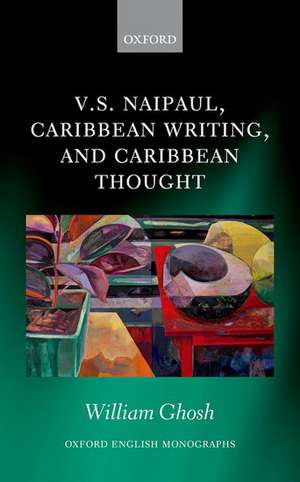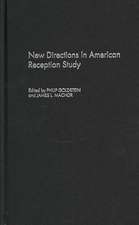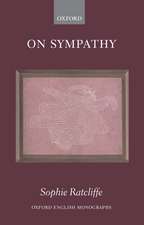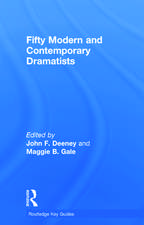V.S. Naipaul, Caribbean Writing, and Caribbean Thought: Oxford English Monographs
Autor William Ghoshen Limba Engleză Hardback – 19 noi 2020
Din seria Oxford English Monographs
- 12%
 Preț: 492.54 lei
Preț: 492.54 lei - 28%
 Preț: 472.45 lei
Preț: 472.45 lei - 28%
 Preț: 487.35 lei
Preț: 487.35 lei - 23%
 Preț: 473.01 lei
Preț: 473.01 lei - 24%
 Preț: 498.33 lei
Preț: 498.33 lei - 21%
 Preț: 528.16 lei
Preț: 528.16 lei - 28%
 Preț: 497.29 lei
Preț: 497.29 lei - 28%
 Preț: 406.14 lei
Preț: 406.14 lei - 16%
 Preț: 473.94 lei
Preț: 473.94 lei - 28%
 Preț: 473.47 lei
Preț: 473.47 lei - 26%
 Preț: 527.79 lei
Preț: 527.79 lei - 22%
 Preț: 497.63 lei
Preț: 497.63 lei - 30%
 Preț: 516.27 lei
Preț: 516.27 lei - 28%
 Preț: 437.84 lei
Preț: 437.84 lei - 26%
 Preț: 515.71 lei
Preț: 515.71 lei - 28%
 Preț: 498.33 lei
Preț: 498.33 lei - 12%
 Preț: 494.84 lei
Preț: 494.84 lei - 27%
 Preț: 407.74 lei
Preț: 407.74 lei - 23%
 Preț: 472.09 lei
Preț: 472.09 lei - 16%
 Preț: 472.24 lei
Preț: 472.24 lei - 16%
 Preț: 473.16 lei
Preț: 473.16 lei - 25%
 Preț: 521.94 lei
Preț: 521.94 lei - 30%
 Preț: 505.56 lei
Preț: 505.56 lei - 30%
 Preț: 673.12 lei
Preț: 673.12 lei - 34%
 Preț: 774.20 lei
Preț: 774.20 lei - 23%
 Preț: 329.18 lei
Preț: 329.18 lei - 34%
 Preț: 800.49 lei
Preț: 800.49 lei - 34%
 Preț: 1078.63 lei
Preț: 1078.63 lei - 34%
 Preț: 1034.87 lei
Preț: 1034.87 lei - 34%
 Preț: 1167.37 lei
Preț: 1167.37 lei - 34%
 Preț: 1019.76 lei
Preț: 1019.76 lei - 31%
 Preț: 351.12 lei
Preț: 351.12 lei - 20%
 Preț: 230.49 lei
Preț: 230.49 lei - 34%
 Preț: 979.50 lei
Preț: 979.50 lei - 34%
 Preț: 1181.23 lei
Preț: 1181.23 lei - 34%
 Preț: 1035.56 lei
Preț: 1035.56 lei - 20%
 Preț: 272.80 lei
Preț: 272.80 lei - 34%
 Preț: 1035.28 lei
Preț: 1035.28 lei - 34%
 Preț: 1080.62 lei
Preț: 1080.62 lei - 46%
 Preț: 466.34 lei
Preț: 466.34 lei - 34%
 Preț: 991.10 lei
Preț: 991.10 lei - 34%
 Preț: 874.40 lei
Preț: 874.40 lei - 31%
 Preț: 698.29 lei
Preț: 698.29 lei - 34%
 Preț: 860.98 lei
Preț: 860.98 lei - 34%
 Preț: 1108.02 lei
Preț: 1108.02 lei - 34%
 Preț: 859.05 lei
Preț: 859.05 lei - 34%
 Preț: 1006.88 lei
Preț: 1006.88 lei - 34%
 Preț: 1196.96 lei
Preț: 1196.96 lei - 31%
 Preț: 421.29 lei
Preț: 421.29 lei
Preț: 490.28 lei
Preț vechi: 653.38 lei
-25% Nou
Puncte Express: 735
Preț estimativ în valută:
93.82€ • 100.32$ • 78.22£
93.82€ • 100.32$ • 78.22£
Carte disponibilă
Livrare economică 17-24 martie
Preluare comenzi: 021 569.72.76
Specificații
ISBN-13: 9780198861102
ISBN-10: 0198861109
Pagini: 208
Dimensiuni: 143 x 224 x 16 mm
Greutate: 0.36 kg
Editura: OUP OXFORD
Colecția OUP Oxford
Seria Oxford English Monographs
Locul publicării:Oxford, United Kingdom
ISBN-10: 0198861109
Pagini: 208
Dimensiuni: 143 x 224 x 16 mm
Greutate: 0.36 kg
Editura: OUP OXFORD
Colecția OUP Oxford
Seria Oxford English Monographs
Locul publicării:Oxford, United Kingdom
Recenzii
This book's most significant intervention is...in its expansive rethinking of his relationship with other Caribbean thinkers. Perhaps due to the book's subject, Ghosh does not shy away from exploring the changing attitudes and cultural politics of authors such as Lamming, Wynter, and Brathwaite. Indeed, he presents these shifts in political thought over time, not as errors or oversights, but rather as carefully attuned reactions that respond to the climate of the moment. The book also provocatively invites further study of Naipaul's impact on writers from other global contexts.
I began by suggesting that it would be difficult to find anything new to say about Naipaul, yet I find that Ghosh has managed to tease out a number of ways in which to do just that.
Although Naipaul's resistance to and even rejection of his Caribbean roots is well known, William Ghosh persuasively argues for the literary-historical value of reading him in a Caribbean context. [...] One of the book's strengths is its presentation of a network of Caribbean writers and thinkers grappling not only with the same historical concerns, but also with the impact of their work on one another.
It is not an easy task to write anything new about an author as well known as V. S. Naipaul, [...] yet I find that Ghosh has managed to tease out a number of ways in which to do just that. Not only does Ghosh resituate Naipaul's writing as a major contributory factor to many of the views on colonization held by Caribbean intellectuals, he also shows that Naipaul's whole body of work can be read as a genuine attempt to 'redefine these communities, and their postcolonial experiences'.
I began by suggesting that it would be difficult to find anything new to say about Naipaul, yet I find that Ghosh has managed to tease out a number of ways in which to do just that.
Although Naipaul's resistance to and even rejection of his Caribbean roots is well known, William Ghosh persuasively argues for the literary-historical value of reading him in a Caribbean context. [...] One of the book's strengths is its presentation of a network of Caribbean writers and thinkers grappling not only with the same historical concerns, but also with the impact of their work on one another.
It is not an easy task to write anything new about an author as well known as V. S. Naipaul, [...] yet I find that Ghosh has managed to tease out a number of ways in which to do just that. Not only does Ghosh resituate Naipaul's writing as a major contributory factor to many of the views on colonization held by Caribbean intellectuals, he also shows that Naipaul's whole body of work can be read as a genuine attempt to 'redefine these communities, and their postcolonial experiences'.
Notă biografică
William Ghosh is an Associate Professor of World Literatures in English at Christ Church, University of Oxford.




















